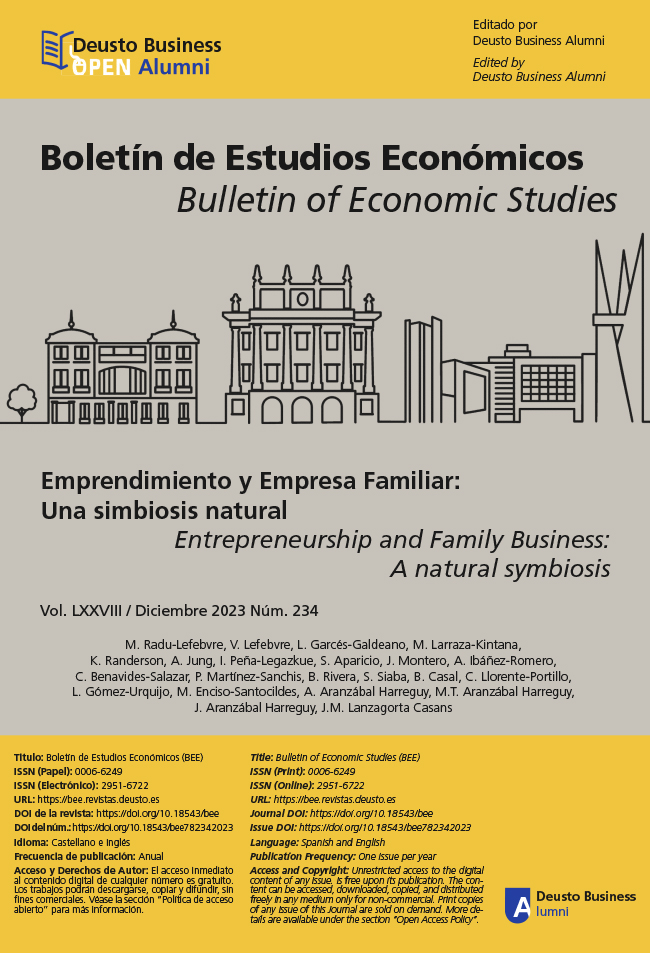Entrepreneurship and family business in Spain: Analysis of its main characteristics and profile of family entrepreneurs
Abstract
Family businesses play a key role in the economy, accounting for around 89% of the business fabric of our country, with a contribution to GDP of 57.1% and the creation of 67% of private employment. Entrepreneurial activity plays a crucial role after the COVID-19 pandemic as it is one of the main indicators of economic recovery in periods of recession. With data from the Global Entrepreneurship Monitor (GEM) for 2021, the main socio-demographic characteristics of family business entrepreneurs have been analyzed, considering their main differences with respect to the rest of businesses that do not have this nature. The results show that 86.37% of those surveyed stated that their family had participated in the start-up of the business under the figure of co-owner and/or co-administrator, the most common form of participation being that of co-management and family co-ownership. The predominant form was self-employment and the gender with the highest levels of family entrepreneurship was female. These results are particularly relevant, given that families play an important role in the creation of businesses and stable employment. Likewise, knowing the profile of the family entrepreneur can facilitate the design of incentives for entrepreneurship.
Received: 28 April 2023
Accepted: 23 June 2023
References
Aldrich, H. E., & Cliff, J. E. (2003). The pervasive effects of family on entrepreneurship: Toward a family embeddedness perspective. Journal of Business Venturing, 18(5), 573-596. https://doi.org/10.1016/s0883-9026(03)00011-9
Arteche, J., & Rementeria, S. (2012). La empresa familiar y el emprendimiento—Family business and entrepreneurship.
Bernadich, M., & Urbano, D. (2013). Creación y desarrollo de empresas familiares: Una revisión de literatura desde el enfoque institucional. En V. Fernandez, Nuevas investigaciones sobre la gestión de la empresa familiar en España (1st ed., pp. 11-44). OmniaScience. https://doi.org/10.3926/oms.13
Block, J. (2010). Family Management, Family Ownership, and Downsizing: Evidence from S&P 500 Firms. Family Business Review, 23(2), 109-130. https://doi.org/10.1177/0894486509360520
Casillas, J. C., Moreno, A. M., & Barbero, J. L. (2011). Entrepreneurial orientation of family firms: Family and environmental dimensions. Journal of Family Business Strategy, 2(2), 90-100. https://doi.org/10.1016/j.jfbs.2011.03.002
Deloitte. (2019). Encuesta Global de Empresas Familiares. Deloitte Spain. https://www2.deloitte.com/es/es/pages/about-deloitte/articles/encuesta-global-empresa-familiar.html
Gutiérrez Olvera, S. (2018). Emprendimiento en las empresas familiares / Entrepreneurship in family businesses. RICEA Revista Iberoamericana de Contaduría, Economía y Administración, 4(7), 163. https://doi.org/10.23913/ricea.v4i7.119
Instituto de la Empresa Familiar. (2022). El poder regenerador de la Empresa Familiar. Instituto de la Empresa Familiar. https://www.iefamiliar.com/publicaciones/el-poder-regenerador-de-la-empresa-familiar/
Instituto de la Empresa Familiar. (2023a). La Empresa Familiar. Instituto de la Empresa Familiar. https://www.iefamiliar.com/la-empresa-familiar/
Instituto de la Empresa Familiar. (2023b). Cifras empresa familiar. Instituto de la Empresa Familiar. https://www.iefamiliar.com/la-empresa-familiar/cifras/
Kelley, D., Gartner, W., & Allen, M. (2020). GEM Global Entrepreneurship Monitor. GEM Global Entrepreneurship Monitor. Recuperado 27 de abril de 2023, de https://www.gemconsortium.org/report/20192020-global-entrepreneurship-monitor-gem-family-entrepreneurship-report-2
Le Breton-Miller, I., Miller, D., & Lester, R. H. (2011). Stewardship or Agency? A Social Embeddedness Reconciliation of Conduct and Performance in Public Family Businesses. Organization Science, 22(3), 704-721. https://doi.org/10.1287/orsc.1100.0541
Licht, A. N., & Siegel, J. I. (2005). The Social Dimensions of Entrepreneurship (SSRN Scholarly Paper N.o 824844). https://papers.ssrn.com/abstract=824844
Mungai, E., & Velamuri, S. R. (2011). Parental Entrepreneurial Role Model Influence on Male Offspring: Is it Always Positive and when does it Occur? Entrepreneurship Theory and Practice, 35(2), 337-357. https://doi.org/10.1111/j.1540-6520.2009.00363.x
Nuez, M. J. A., & Górriz, C. G. (2008). El emprendedor y la empresa: Una revisión teórica de los determinantes a su constitución. Acciones e Investigaciones Sociales, 26, Art. 26. https://doi.org/10.26754/ojs_ais/ais.200826332
Peña, I., Guerrero, M., González-Pernía, J. L., & Montero, J. (2020). Global Entrepreneurship Monitor. Informe GEM España 2019-2020. Editorial de la Universidad de Cantabria. https://doi.org/10.22429/euc2020.024
Red GEM de España. (2021). Informes Nacionales. GEM España. https://www.gem-spain.com/informes-nacionales/
Zahra, S. A. (2005). Entrepreneurial Risk Taking in Family Firms. Family Business Review, 18(1), 23-40. https://doi.org/10.1111/j.1741-6248.2005.00028.x
License:
Works published in this journal are available since 2021 under the Creative Commons Attribution-NonCommercial 4.0 International license - CC BY-NC 4.0. Content prior to 2021 is not covered by the journal's current Open Access policy.
Authors' Rights:
Authors retain copyright over their work published in the Bulletin of Economic Studies and grant the Bulletin of Economic Studies non-exclusive rights to exploit the work for layout, publication, and dissemination purposes. This license allows the Bulletin of Economic Studies to distribute, reproduce, and disseminate the work on its platform and through other media, subject to the conditions outlined in this notice.
Readers' Rights:
Readers may read, download, print, search, share (copy, redistribute, or link to full text), or adapt (remix, transform, and build upon the material) the content, provided that:
- The materials are not used for commercial purposes.
- The original work is properly cited, including the name of the author and the source.
- Any modifications made to the original content are clearly indicated.
Commercial use of the materials is prohibited without the express permission of the authors. For clarity, commercial use is defined as any activity intended for financial gain or involving direct commercial exchange.
Conditions of Use:
The use of content must not infringe the rights of others or be used in a way that could damage the reputation of the author or the Bulletin of Economic Studies.
Responsibility for Content:
Authors are responsible for the content of their papers and the Bulletin of Economic Studies is not responsible for the opinions therein expressed.
More Information:
Open Access, Licensing, and Copyright Policy


.jpg)
.jpg)
.jpg)








